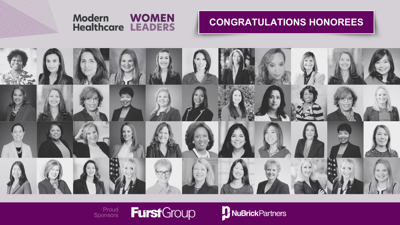As the daughter of a surgeon and an operating room nurse and now as one of the leading healthcare executives in the nation, Gail Donovan has been around hospitals all her life. So when she says she’s a bit worried about healthcare reform, one tends to listen more intently.
One in a series of profiles of Modern Healthcare’s Top 25 Women in Healthcare (sponsored by Furst Group)
As the daughter of a surgeon and an operating room nurse and now as one of the leading healthcare executives in the nation, Gail Donovan has been around hospitals all her life. So when she says she’s a bit worried about healthcare reform, one tends to listen more intently.
“Hospitals are like running 40 different businesses,” says Donovan, Executive Vice President and Chief Operating Officer of Continuum Health Partners, Inc. “As a large provider system, our hospital emergency rooms care for 250,000 visits a year in our system and we have very large ambulatory services handling more than 3 million visits a year. I love being able to provide access and to make sure that, as much as possible, we’re able to meet the needs of the very large and diverse communities we serve.”
While she agrees that changes are necessary, Donovan says some of the details, like value-based purchasing, need to take into recognition the realities that urban hospitals and systems wrestle with every day.
“We know how to run financially distressed hospitals because we’ve had to learn how to do that, and move from operating in the red to operating in the black, all the while we’re trying to improve and demonstrate improvements in quality,” she says.
It’s the details that matter to Donovan in reform and in healthcare in general.
“The absolute top quality that an executive needs to have is operational effectiveness,” she says. “Essentially, you must be grounded in details and be able to be not just productive but effective in managing the details of your work and your job.
“It’s through this that you can then have strategic vision. I don’t think you can really have strategic vision unless you understand what you’re managing today.”
Donovan and her team long have been visionary about the need for electronic medical records, but she credits her board with having the courage to invest more than $100 million in EMRs even as the system was struggling to provide basic core services. With an eye to the future, Continuum is well-positioned for whatever reform may bring, but Donovan wonders where the funds to help urban hospitals with compliance will come from as value-based purchasing expands from six core measures to 30 or 40.
“For urban hospitals to potentially be penalized and have reimbursement taken away could take a very fragile healthcare structure and create significant problems and an inability to maintain services.”
Many urban hospitals, Donovan says, are capital-starved and have a high dependence on Medicare, Medicaid and the bad-debt charity care pools.
“If those dynamics are altered without having a proper definition of safety-net facilities, like a number of my institutions are, then that dynamic could completely upend our ability to meet the needs of the very large communities we serve.”
Despite that sober warning, Donovan clearly enjoys her chosen field. To varying degrees, she has been serving since she was 12 and first became a hospital volunteer. She interned in health administration before going to graduate school and did a residency as part of her graduate degree that was “pivotal,” she says.
“I still strongly advise graduate students to seek internships and residencies. They’re called different things now, but exposure early on to a number of different organizations and their components led to job opportunities for me.”
She also credits luck in finding professional mentors who championed her early in her career.
“I was usually the youngest in the room – and the only woman,” Donovan says. “I think that has changed in certain settings, but there continues to be a lack of women in the most senior of positions in hospitals and healthcare systems.
“I think we’re changing that, but it’s a little bit slower, perhaps because of some concerns about work-life balance. As a mother, I know that if I did not have a supportive husband who had greater flexibility, I wouldn’t have been able to put in the time and the commitment to do what I needed to do professionally as well as support my family.”
Her professional reach has extended far beyond her system. She was president of the Metropolitan Health Administrators Association before it became the New York chapter of ACHE. And, with Susan Waltman, Executive Vice President and General Counsel for the Greater New York Hospital Association, Donovan spearheaded emergency preparedness measures in the wake of 9/11 that the Joint Commission has adopted as standards for all U.S. hospitals. Such responses, applicable to natural disasters as well as terrorist attacks, go beyond medicine, she says.
“So much of emergency response ends up dealing with adequate communications structures and systems,” she says. “And even in a sophisticated environment like New York, that continues to be one of the top challenges. So one of the outgrowths of the post-9/11 work was ongoing emergency preparedness that includes all the municipal structures and systems with the provider community.
“It’s why my job is fun,” she adds. “I actually love my job. Always have.”


